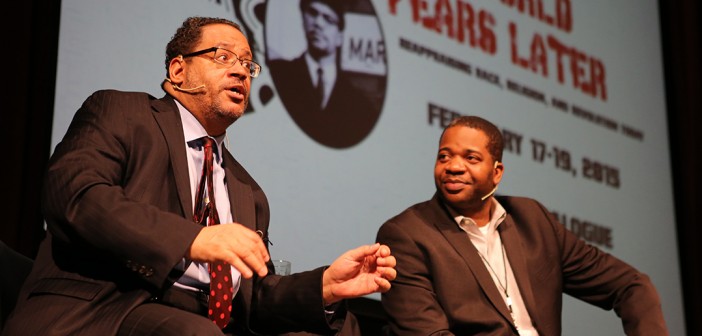A Brown and White reporter sat down with Michael Eric Dyson, professor of sociology at Georgetown University and author of over fifteen books, before his keynote at Lehigh’s Malcolm X conference on Feb. 17. Dyson’s 1994 book Making Malcolm: The Myth and Meaning of Malcolm X became a New York Times notable book of the year. He has hosted multiple radio shows and has appeared to provide commentary and analysis on National Public Radio, CNN, Real Time with Bill Maher and MSNBC.
Q: How does the work of Malcolm X stay relevant to issues today and why is it important to keep this conversation going?
A: Well, first of all, I want to applaud Professor James Peterson and the good folk at Lehigh for having the foresight and vision to understand this landmark occasion of 50 years of engaging, celebrating, interrogating and examining the legacy of Malcolm X, El-Hajj Malik El-Shabazz.
He remains relevant because he spoke presciently to the issues that matter today: black identity, the politics of black rage, the expression of black dissent, the politics of black power and the importance of consolidating varieties of expressions within black communities —different ideologies and politics— and bringing them together under a banner of functional solidarity. So Malcolm X remains important because he spoke so powerfully to the issues that still concern us today, whether it’s police brutality, whether it’s the upward mobility of the masses of black people, whether it’s the over incarceration of African American men, and increasingly women, and whether it’s the need for black people to know our history and combat the pernicious forms of amnesia that really stalk the culture.
So in that sense he continues to be important and it’s important to remember him because we’ve had the kind of hegemony and dominance of Martin Luther King Jr., for good reason, but it has tended to cloud the contributions of others and it sets up a false polarity between Malcolm X and Martin Luther King Jr. They to be sure were valid expressions of competing ideologies but those ideologies began to converge at a certain point and their thinking began to meet in the middle, so to speak. Malcolm X, who long before he publicly renounced the official hatred of white people, had embraced varieties of whiteness within Islam, and understood the necessity of having a political organization as well as a religious one.
Martin Luther King Jr. had begun to understand the importance of self-affirmation of blackness that was so critical to the psychological reconstruction of Black America. He talked about dipping one’s pen into the ink of one’s own Olympian manhood —and that sounds like something straight out of Malcolm X. So there was an influence that each side had on the other and it forced and forged a provisional, I think, coalescence that, had both men lived, would have manifested itself in far more occasions of agreement than disagreement.
Q: What would you say, in your opinion, is one of the biggest impacts Malcolm X has had on the way our culture has been shaped today?
A: Well, especially in black culture, the affirmation of blackness, the belief that black is beautiful. That’s taken for granted amongst some people, though now we’ve come full circle. Darker-skinned black people are still demonized the way that lighter-skinned people are not. Lighter-skinned people are highlighted and elevated to positions of authority and cultural desire in ways that darker-skinned black people are not.
So we still have a battle of internal psychic combustion that goes on in Black America. Unfortunately we have not contended with or confronted it in the most profound sense that our culture demands. Malcolm X was a catalyst for understanding that we are beautiful and black, and that our beautiful blackness must be celebrated politically and socially as well as culturally. His impact has been, of course, to celebrate the profound contributions of black people to the histories of our own struggles against oppression, to the expression of dissent against dominant viewpoints that tend to obscure or marginalize black identity and the insistence that what it means to be human is also what it means to be black.
When we look at Black Lives Matter, that grows out of the kind of insistence of Malcolm X and others in the Black Nationalist movement and more broadly in the Black Power movement, to insist upon the utter value and not only the practical but the political utility of blackness in public. Malcolm X is one of the instigators and inspirational forces behind that.
Q: How do you think social media and the way our society is has changed the way protests take place?
A: There’s a lot of positive stuff that comes out of social media. A lot of people beat up on young people thinking that they believe once you tweet you’ve done your job. Once you’ve Tindered or Instagrammed or Snapchatted or Google Plused that you’ve done your job. I think for the most part that’s not true. Now, do some people believe that? Of course. But not the vast majority of people. It becomes another forum, another way for people to collect ideas and identities and to express dissent or agreement, to forge solidarity, to articulate resistance.
Studies have been done. The same people who organize in social media tend to flow over into concrete expressions of social resistance. So there’s no either-or going on here. Either you’re on social media where you’re tweeting, Instagramming, or Snapchatting, or Vimeoing, or Vineing, or you’re in the trenches on the ground. It’s both and, not either or.
If Martin Luther King Jr. had access to Twitter it would have been great. It could have been 250,000 people at the Lincoln memorial but maybe a half a million would have showed up because the word could have gotten out, people could’ve been tweeted and Instagrammed and Facebooked and the like. Organizing has been facilitated as a result of that. There are some cyber organization and cyber politicization that has yielded tremendous and concrete benefits. Colorofchange.org with Brother Rashad Robinson I think has done an incredibly important job of organizing dissent within the mainstream political viewpoints.
Trayvon Martin would never have been a cause célèbre unless people on Twitter insisted on social media, insisted that this case become real. What happened? Once it became real, established in the collective mindset, the media footprint got registered, then leaders like Al Sharpton and others were invited in and it became an on-the-ground political moment of contestation and organization.
So without social media, that might not have been done as quickly or as easily as it occurred. So I think social media is incredibly important to extending the tentacles of organizing throughout the country, and indeed the world. It’s a potent ally to those who are invested in social democracy and social justice.
Q: How do you think that Malcolm X’s impression in the public, his legacy has changed over time?
A: Malcolm was initially seen as a devil. Ironically enough, as the nation of Islam referred to “white devils.” He was seen as a menacing figure in American culture, he was seen as a rabid racist and a person who was full of hate and venom. But as Ossie Davis Jr., the late great actor, who with his wife Ruby Dee formed one of the great one-two punches, or one-one punches, in terms of social activism among entertainers. He said in his eulogy for Malcolm X, “when did you see him violent? When did you see him hate-filled? When could you recall Malcolm doing something that was untoward?” So the reputation was not earned, but the rhetoric was fiery.
Much like rappers today, ‘look, I’m spittin’ it, but I’m not living it, so to speak, living it to the degree that I’m inciting people to take seriously the ideas I promote, but I’m not suggesting that there be a literal interpretation of my ideas and a literal application of violence.’ Malcolm X talked about “by any means necessary,” which obviously is a logical contradiction, cause if they’re necessary, no means but the ones that are necessary can be realized. But it was such a potent, philosophical argument in defense of black people whose lives were vulnerable and not of much value to the dominant culture.
So he was initially seen as a hate-filled antagonist and a person who was juxtaposed to Martin Luther King Jr., but since then, he has become recognized as one of the great leaders of the 20th century, not only among African American people but for all people who are interested in freedom and justice and democracy. After all, he was bringing the United States up on charges before the United Nations. He had an international and global vision.
So now that same Malcolm who was seen as an antagonist, as a man who was full of hostility and hate, is seen as a transformative figure who’s important to the black psyche, important to the expression of black resistance, to a dominant culture that is white supremacist or at least full of black bourgeoisie, aspersion towards poor people, and a man who expressed the central concept of evolution.
If Malcolm is important today, it’s because he was relentlessly changing himself and challenging himself, and evolving. If many of our leaders and activists and organizers could do the same, it would be important. Right now, he’d have to rethink his vision of women. He already did, he used to say that the closest thing to a woman is the devil and the closest thing to the devil was a woman. But he changed that even when he lived. He would’ve had to challenge that far more, had he lived and I’m confident he would have done so. He would’ve constantly and relentlessly evolved. I think President Obama points this out as one of the great contributions that Malcolm X made.
So when we think about him now, he’s seen as an august, international, global figure of remarkable and tremendous relevance to our contemporary culture but not without a fight. People had to insist that Malcolm be taken seriously. And you know what happens, once you’re seen as a person who is antithetical to America, then you begin to define America, you’re against American democracy, now you’re the very extension of that. But Malcolm X warned, he said we’re not beneficiaries of democracy, we are victims of democracy.
As we think about that now, if we take his political lessons to heart, they can provide us a lot of language and a vocabulary to both express our embrace of the country but also our challenge to it. So that’s why he’s important. Now, he’s gone from a hostile figure to a healing figure, but always beloved among African American people but now more broadly throughout the world for the incredible contributions he made.






Comment policy
Comments posted to The Brown and White website are reviewed by a moderator before being approved. Incendiary speech or harassing language, including comments targeted at individuals, may be deemed unacceptable and not published. Spam and other soliciting will also be declined.
The Brown and White also reserves the right to not publish entirely anonymous comments.